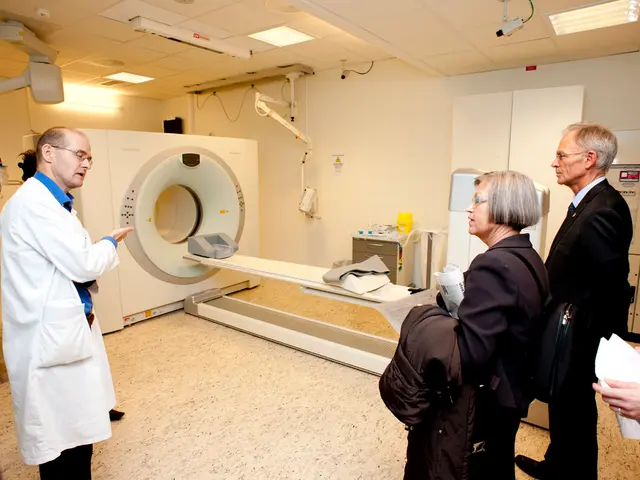German Health System President Issues Supply Crisis Warning
President of Medical Association Issues Alert Over Impending 'Shortage' Crisis - President issues alert about potential shortage in essential supplies
The President of the German Medical Association, Klaus Reinhardt, has warned of potential disruptions in Germany's medical network for patients if reforms to enhance system efficiency are not implemented promptly. Reinhardt shared his concerns with the German Press Agency, stating, "Our healthcare system is on an unchecked path towards a supply crisis if we don't act decisively."
One key approach to rectifying this issue is improving coordination in care. Reinhardt suggested that patients should be encouraged to register with a general practitioner who would then manage their further treatment.
These discussions surrounding healthcare efficiency are prevalent at the ongoing German Doctors' Day in Leipzig, with the newly appointed Federal Minister of Health, Nina Warken (CDU), expected to attend.
Reinhardt further explained that in Germany, patients often find themselves tasked with organizing and coordinating their own care, placing a significant burden on vulnerable groups such as the elderly, chronically ill, and those with lower health literacy. Current statistics show that Germany has one of the highest rates of doctor contacts per capita globally, with an average of 9.6 contacts per year. In some regions, half of the population regularly consults with two general practitioners.
Reinhardt's proposed model for addressing this issue involves general practitioners making referrals only when further specialist treatment is required or anticipated. Over time, a principle of "digital before outpatient before inpatient" should be utilized to support patients during their care journey. This approach would introduce digital means for assessment and guidance at the onset, followed by visits to general practitioners, and subsequent hospitalization if necessary.
However, patient advocates argue that the supply crisis is self-made, due to inefficient management of outpatient practices. The German Foundation for Patient Protection claims that health practitioners with excessive caseloads coexist with those reporting low patient counts. Moreover, urban areas are over-supplied with medical facilities, while there is a dearth of services in rural areas where nearly 60% of the population resides.
The German healthcare system faces fiscal challenges, including strains on the statutory health insurance system, and the government is working on strategic reforms to manage these issues. Meanwhile, sustainability measures such as digitalization and telemedicine are being emphasized as they offer improvements in patient care and reduced hospital visits and energy consumption.
Additionally, the European Union's proposed Critical Medicines Act aims to bolster investment in EU manufacturing capacity and diversify supply chains, with the goal of reducing dependence on third-party manufacturing and strengthening supply chains. Furthermore, the new German government is advocating for reshoring the production of critical drugs and medical products back to Germany and Europe to enhance supply security.
These measures address various healthcare concerns, including supply security, sustainability, and system reforms, though there is currently no explicit detail on addressing the supply crisis as warned by Reinhardt in the available search results.
- EC countries could potentially learn from Germany's healthcare reform efforts, particularly focus on vocational training for healthcare professionals, to improve overall system efficiency and supply security.
- In light of the current medical supply crisis in Germany and potential reform solutions, it's essential to discuss the impact of medical-conditions on health-and-wellness and how vocational training can enable healthcare professionals to better address patient needs and reduce the burden on vulnerable groups such as the elderly, chronically ill, and those with lower health literacy.
- As the German government works on strategic reforms to manage fiscal challenges and improve supply security, it's important to consider the implications of these reforms on the political landscape, both domestically and within the EU, as well as staying informed on general news related to healthcare system improvements and supply chain security.







